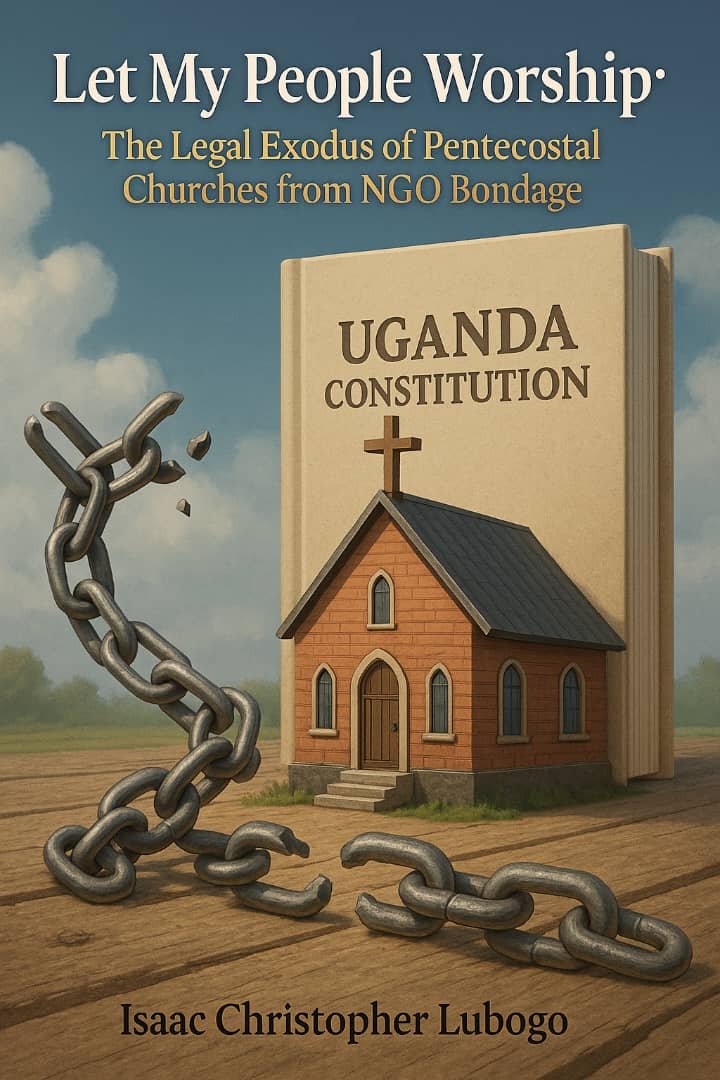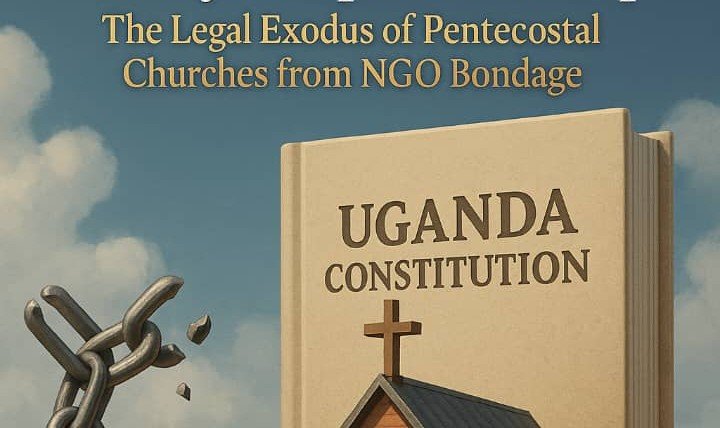By Isaac Christopher Lubogo
> “When the altar is mistaken for a business and prayer is filed under compliance, the spirit of worship suffocates under the weight of bureaucracy.”
In a nation where laws often walk in ahead of liberty, a long-awaited deliverance has arrived at the gates of the Pentecostal altar. On the 9th of July, 2025, the Attorney General of Uganda, Kiryowa Kiwanuka, issued a watershed directive that will be remembered not only in the footnotes of legal reform—but in the songbooks of revival. No longer will Pentecostal churches—those sanctuaries of raw prayer, revival fire, and untamed spiritual expression—be forced to march under the legal yoke of NGO registration if their calling is purely spiritual.
This is not merely a policy shift. It is a legal Exodus—a parting of the bureaucratic Red Sea for those who, like ancient Israel, longed for the liberty to worship without Pharaoh’s paperwork. Let My People Worship is the cry now answered.
But this journey is layered with nuance and requires wisdom. For while the altar has been liberated, the algorithm remains. Bureaucratic oversight is still required for churches engaged in education, healthcare, development work, or income-generating projects. In short: the sanctuary is free, but the storehouse must still be accountable.
This moment calls for deep discernment: are we sanctuaries or corporations? Are we solely messengers of heaven, or are we hybrid institutions navigating both the spiritual and the social? It is time for the Pentecostal movement to navigate its legal identity with clarity—to rightly divide between the holy and the operational, the altar and the enterprise.
Indeed, we are witnessing a kind of redemption—a movement from Cross to Constitution, where the state finally begins to see spiritual houses not merely as subjects of regulation, but as sacred institutions with a protected place in Uganda’s constitutional order.
Yet, we must be vigilant. Being spiritual is not being illegal, but being disorganized may render the altar vulnerable once more. The Attorney General’s directive is a divine reprieve—but not a blanket amnesty. It’s an invitation to establish internal governance, to separate what belongs to Caesar and what belongs to God, and to boldly declare our purpose—worship without compromise, service without confusion.
In this treatise, we shall explore the legal, constitutional, and spiritual implications of this directive; we shall analyze what it frees, what it demands, and what it portends for the future of Pentecostal identity in Uganda. Above all, we shall remind every church leader that freedom is not the absence of law—it is the triumph of purpose over regulation.
The Attorney General of Uganda, Kiryowa Kiwanuka, has issued a directive dated July 9, 2025, instructing the NGO Bureau and the Uganda Registration Services Bureau (URSB) to suspend demands that Pentecostal (Born‑Again) churches register as NGOs, if they are engaged solely in spiritual instruction and worship .
🔍 Key Implications
1. Enhanced Religious Freedom & Equality
Eliminates regulatory burdens: These churches will no longer need to submit land titles, pastor résumés, inspection reports, and more for NGO compliance .
Leveled playing field: Aligns Pentecostal churches with mainstream religious groups (e.g., Catholic, Anglican, Muslim), which have never faced NGO-style registration .
Constitutional guarantee: Reinforces freedom of worship, allowing spiritual bodies to operate without perceived ‘second-class’ status .
2. Administrative Shift & Self-Governance
New self-regulatory responsibility: Churches must establish unified legal bodies or frameworks, similar to traditional denominations .
Urgency to formalize governance: Pastors and church leadership are expected to collaborate in forming structured legal entities to guide operations.
3. Selective Application of the Directive
Spiritual-only vs. social services: The exemption does not apply if the church engages in NGO-like activities—such as education, healthcare, or community development. Those activities must still comply with NGO or company registration requirements .
4. Potential Oversight and Accountability Concerns
Risk of inconsistencies: Without NGO registration, churches lose a standardized external oversight mechanism.
Possibility of impropriety: The shift places weight on internal governance. Churches that delay forming legal structures may fall into murky territory.
Gap in regulations: Reflects ongoing legal ambiguity around faith-based organizations in Uganda—though this directive paves the way for clearer future regulations .
📣 Church Leadership Response & Public Reaction
Warnings from legal experts: some emphasize the need for sound internal governance; others flag emerging issues in enforcement and clarity .
📌 Bottom Line
Aspect Implication
Freedom Removes redundant regulation on strictly spiritual churches
Equality Harmonizes treatment across all religious groups
Responsibility Shifts emphasis to internal governance structures
Clarity Sets the stage for a new regulatory framework for spiritual bodies
Caution Doesn’t cover social projects—those still need registration
This directive is a symbolic and practical victory for Pentecostal churches, strengthening their constitutional protections and giving them space to grow. However, the onus is now on church leadership to establish robust governance frameworks and to correctly register non-spiritual activities. Meanwhile, the government will need to develop clear laws for religious bodies more broadly—one that ensures transparency without hindering spiritual life.
And yes, the Attorney General’s directive of July 2025 effectively removes the legal requirement for Pentecostal (Born-Again) churches to register under the NGO framework—but only if they operate solely as places of worship and do not engage in social services or income-generating activities.
✅ Does this mean no more NGO legal requirement?
But conditionally.
Pentecostal churches no longer need to register as NGOs if:
They are strictly involved in spiritual functions (preaching, worship, prayer).
They do not operate schools, clinics, orphanages, media houses, or development projects.
This aligns them with mainstream religious denominations (Catholic, Anglican, Muslim), which have never had to register as NGOs for spiritual functions.
📌 What must such churches do now—especially those already awaiting NGO registration?
1. Suspend their NGO registration process
Those whose activities are purely spiritual may discontinue or withdraw their NGO applications, citing the AG’s directive.
2. Incorporate under religious legal structures
Churches should formalize through:
Trust Deeds
Faith-based umbrella bodies
Religious constitutions or ecclesiastical orders
3. If they offer services beyond preaching, they must:
Register the social wing (e.g., school, hospital) separately under relevant laws—either as:
A Company Limited by Guarantee, or
A Non-Governmental Organization (NGO).
⚖️ The litmus test under this directive.
The Attorney General’s letter implies the following 3-part litmus test:
1. Purpose Test
Is the church’s core activity worship, preaching, and spiritual care?
✅ If yes → Exempt from NGO registration
❌ If no → Proceed to next test
2. Function Test
Does the church run non-spiritual services like schools, clinics, or economic empowerment projects?
✅ If yes → Must register that arm as NGO or company
3. Revenue Activity Test
Is the church involved in income-generating activities beyond offerings and tithes (e.g., selling products, charging fees)?
✅ If yes → Likely needs a corporate structure or NGO registration for accountability

🧭 Final Take
This reform liberates authentic places of worship from bureaucratic burden but does not give blanket amnesty to all Pentecostal-led institutions. Instead, it calls for organizational clarity, separation of spiritual and commercial/social roles, and accountability without prejudice.
Churches must now discern their dual identity—altar vs. enterprise—and organize accordingly.
# Suigeneris
Isaac Christopher Lubogo








